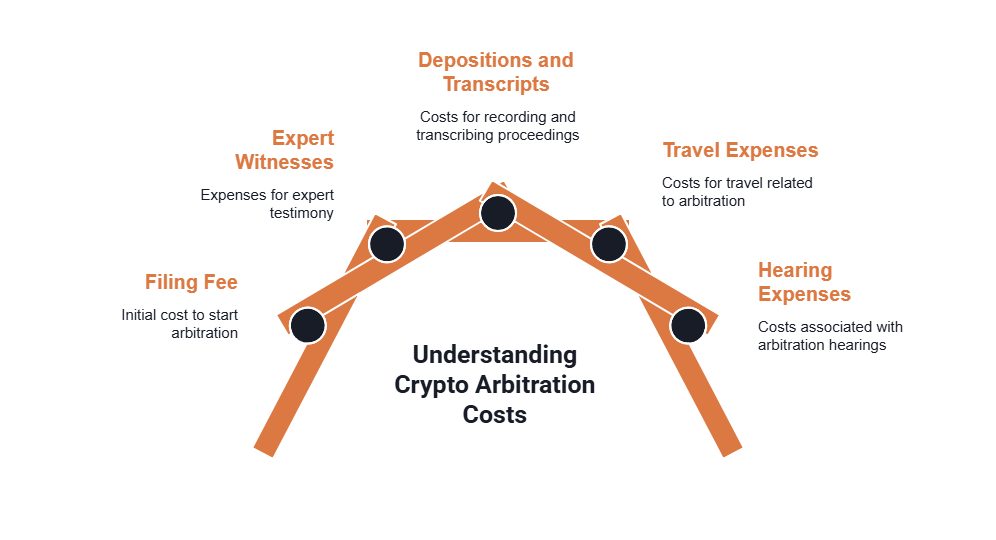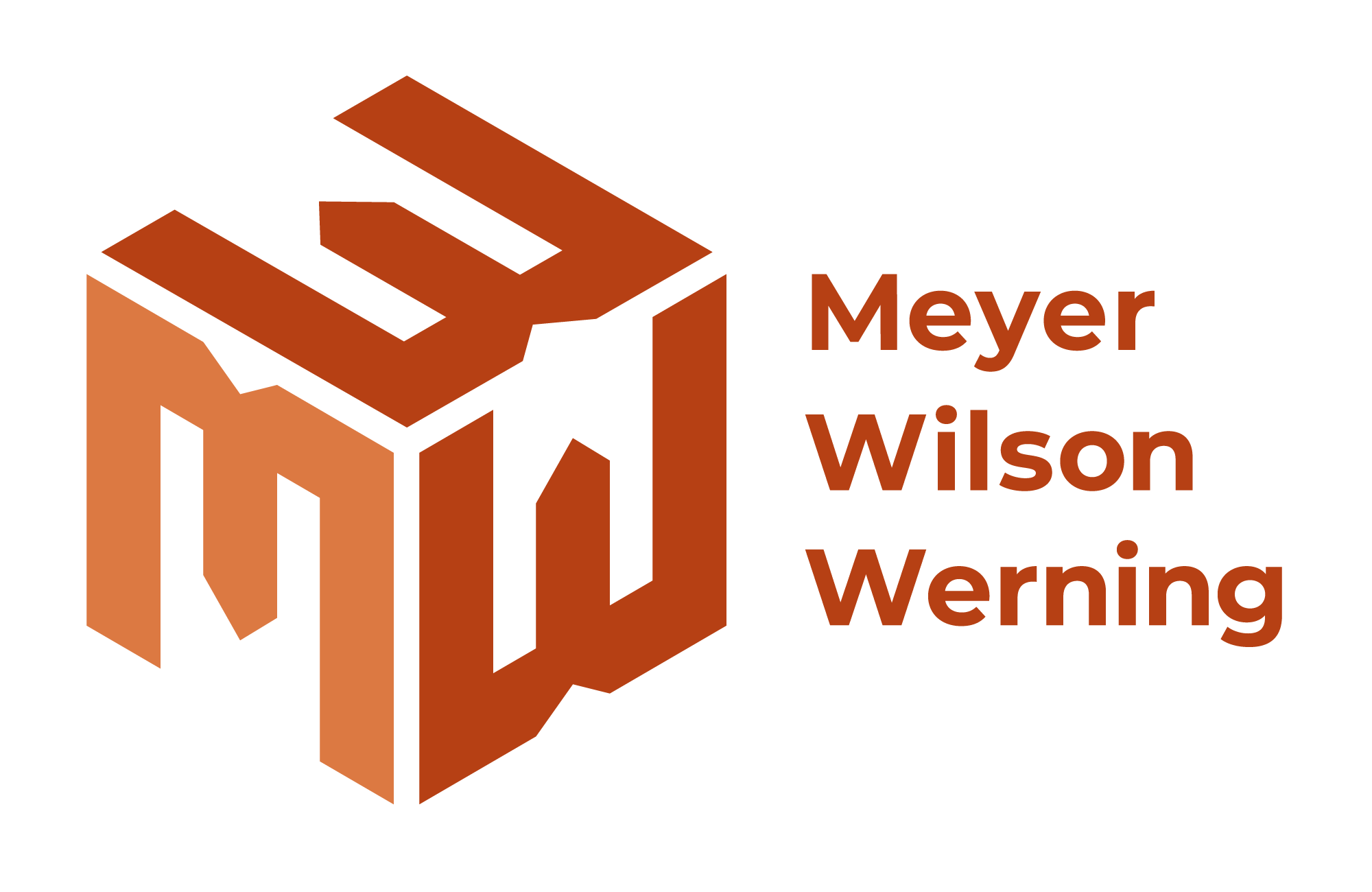For investors pursuing claims against cryptocurrency exchanges, arbitration is often the only available path. But before filing, it’s essential to understand the full scope of arbitration costs, which can reach well beyond the filing fee mentioned in user agreements. Complex crypto cases, especially those involving allegations of theft or fraud, can easily exceed $50,000 in expenses.
At Meyer Wilson Werning, we help clients evaluate these costs and prepare for the financial realities of arbitration so they can make informed decisions about pursuing recovery. If you’ve experienced losses due to crypto fraud on a trading platform, explore your legal options—our team can talk you through the steps of your case and help those who have been wronged. Reach out today to discuss your next steps with us.

Arbitration Fees Through AAA
Most consumer crypto arbitration claims are filed with the American Arbitration Association (AAA). Under AAA’s rules, the exchange is generally required to cover arbitration fees and administrative expenses. That leaves the investor (the claimant) responsible for only the filing fee, currently capped at $225. This fee must be paid when the demand for arbitration is submitted, and it is non-refundable.
However, many investors overlook the cost-shifting clauses buried in exchange user agreements. These provisions may require the losing party to reimburse the winner for arbitration expenses and attorney’s fees. While uncommon in crypto disputes, these clauses can pose real risks if an exchange claims a filing is frivolous or outside the scope of arbitration. Reviewing your agreement for terms like “losing party shall pay” or “costs incurred” is an essential first step.
We Have Recovered Over
$350 Million for Our Clients Nationwide.
Additional Expenses Investors Should Expect
Even when the exchange covers the main arbitration fees, significant out-of-pocket costs often arise. Crypto arbitration cases are highly technical, requiring expert testimony and substantial documentation. An attorney experienced in cryptocurrency fraud can help navigate these initial fees and fight for a fair outcome.
Expert Witnesses
Cases involving crypto theft or exchange failure frequently call for specialized witnesses in cybersecurity or banking. These experts conduct investigations, prepare reports, and provide live testimony. Their fees can range from $10,000 to $30,000, depending on the scope of their work.
Depositions and Transcripts
If depositions are permitted, investors should expect additional costs:
- Court reporters and transcripts – typically $1,000 to $5,000 per session.
Document Production and Printing
Arbitration can also generate unexpected logistical expenses. For example, in one case, an arbitrator ordered the entire docket to be printed for a final evidentiary hearing, resulting in printing costs exceeding $7,500.
Travel and Hearing Expenses
While many arbitrations proceed virtually, in-person hearings may be required, adding travel, lodging, or venue-related costs.
Together, these expenses can push the total costs of arbitration well beyond initial expectations.
Total Costs and Timeline
A fully contested crypto arbitration—complete with expert witnesses, depositions, and a final evidentiary hearing—can exceed $50,000 in hard costs, not including attorney’s fees. Most cases take 12 to 18 months to resolve, meaning costs accumulate over time as the case moves through various phases.
This makes budgeting and strategic planning vital. A skilled attorney can help assess whether:
- Hiring an expert is essential or whether other evidence may suffice.
- Document discovery can be narrowed to reduce production and printing costs.
- An early settlement may provide a more cost-effective outcome than proceeding to a full hearing.
Understanding these factors upfront allows investors to make informed choices rather than being caught off guard by escalating expenses.
Our lawyers are nationwide leaders in investment fraud cases.
Meyer Wilson Werning Offers Support for Crypto Claimants
Arbitration costs in crypto disputes can be daunting, but preparation can make a significant difference. At Meyer Wilson Werning, we guide clients through every stage of the process, from reviewing user agreements for cost-shifting provisions to budgeting for expert witnesses and evidentiary hearings. If you’ve been impacted by a crypto exchange and are considering arbitration, contact us so we can help you understand both the opportunities and financial realities involved in pursuing your claim.
We Are The firm other lawyers
call for support.
Frequently Asked Questions

What are the typical arbitration fees when filing a crypto dispute through the American Arbitration Association (AAA)?
Investors generally pay only a $225 non-refundable filing fee, while the exchange covers arbitration and administrative fees. However, user agreements may include cost-shifting clauses that create added risks.
Can arbitration against a cryptocurrency exchange cost more than the initial filing fee?
Yes, complex cases often require expert witnesses, depositions, and document production, which can push expenses well over $50,000. These costs are separate from attorney’s fees and accumulate over time.
Why are expert witnesses so expensive in cryptocurrency arbitration cases?
Experts in blockchain, cybersecurity, or finance are often needed to explain technical evidence and prepare detailed reports. Their fees can range from $10,000 to $30,000 depending on case complexity.
What other hidden expenses should investors expect in crypto arbitration?
Beyond filing fees, investors may face costs for court reporters, transcripts, large-scale printing, and even travel for hearings. These expenses can add thousands of dollars to a case.
How long does it take for arbitration with a cryptocurrency exchange to conclude, and how does this affect costs?
Most contested arbitrations take 12–18 months, with costs rising at each stage of the process. Strategic planning and legal guidance can help manage expenses and explore settlement opportunities.
Recovering Losses Caused by Investment Misconduct.

